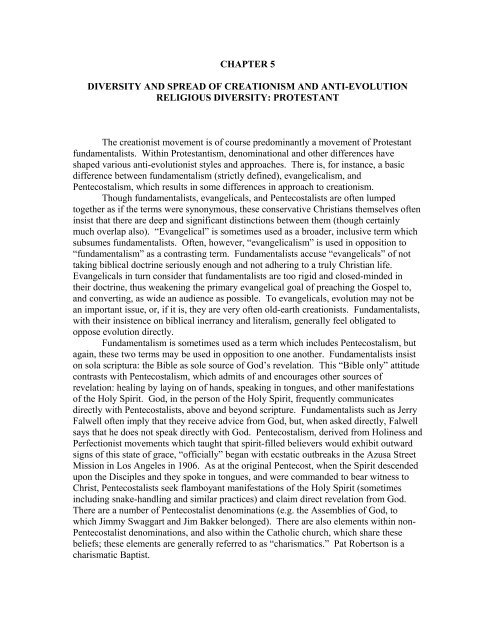Creationism - National Center for Science Education
Creationism - National Center for Science Education
Creationism - National Center for Science Education
You also want an ePaper? Increase the reach of your titles
YUMPU automatically turns print PDFs into web optimized ePapers that Google loves.
CHAPTER 5<br />
DIVERSITY AND SPREAD OF CREATIONISM AND ANTI-EVOLUTION<br />
RELIGIOUS DIVERSITY: PROTESTANT<br />
The creationist movement is of course predominantly a movement of Protestant<br />
fundamentalists. Within Protestantism, denominational and other differences have<br />
shaped various anti-evolutionist styles and approaches. There is, <strong>for</strong> instance, a basic<br />
difference between fundamentalism (strictly defined), evangelicalism, and<br />
Pentecostalism, which results in some differences in approach to creationism.<br />
Though fundamentalists, evangelicals, and Pentecostalists are often lumped<br />
together as if the terms were synonymous, these conservative Christians themselves often<br />
insist that there are deep and significant distinctions between them (though certainly<br />
much overlap also). “Evangelical” is sometimes used as a broader, inclusive term which<br />
subsumes fundamentalists. Often, however, “evangelicalism” is used in opposition to<br />
“fundamentalism” as a contrasting term. Fundamentalists accuse “evangelicals” of not<br />
taking biblical doctrine seriously enough and not adhering to a truly Christian life.<br />
Evangelicals in turn consider that fundamentalists are too rigid and closed-minded in<br />
their doctrine, thus weakening the primary evangelical goal of preaching the Gospel to,<br />
and converting, as wide an audience as possible. To evangelicals, evolution may not be<br />
an important issue, or, if it is, they are very often old-earth creationists. Fundamentalists,<br />
with their insistence on biblical inerrancy and literalism, generally feel obligated to<br />
oppose evolution directly.<br />
Fundamentalism is sometimes used as a term which includes Pentecostalism, but<br />
again, these two terms may be used in opposition to one another. Fundamentalists insist<br />
on sola scriptura: the Bible as sole source of God’s revelation. This “Bible only” attitude<br />
contrasts with Pentecostalism, which admits of and encourages other sources of<br />
revelation: healing by laying on of hands, speaking in tongues, and other manifestations<br />
of the Holy Spirit. God, in the person of the Holy Spirit, frequently communicates<br />
directly with Pentecostalists, above and beyond scripture. Fundamentalists such as Jerry<br />
Falwell often imply that they receive advice from God, but, when asked directly, Falwell<br />
says that he does not speak directly with God. Pentecostalism, derived from Holiness and<br />
Perfectionist movements which taught that spirit-filled believers would exhibit outward<br />
signs of this state of grace, “officially” began with ecstatic outbreaks in the Azusa Street<br />
Mission in Los Angeles in 1906. As at the original Pentecost, when the Spirit descended<br />
upon the Disciples and they spoke in tongues, and were commanded to bear witness to<br />
Christ, Pentecostalists seek flamboyant manifestations of the Holy Spirit (sometimes<br />
including snake-handling and similar practices) and claim direct revelation from God.<br />
There are a number of Pentecostalist denominations (e.g. the Assemblies of God, to<br />
which Jimmy Swaggart and Jim Bakker belonged). There are also elements within non-<br />
Pentecostalist denominations, and also within the Catholic church, which share these<br />
beliefs; these elements are generally referred to as “charismatics.” Pat Robertson is a<br />
charismatic Baptist.

















